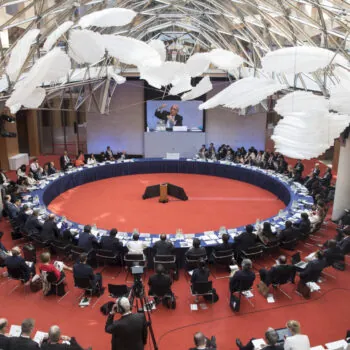The starting gun has fired for the EU referendum, and the battle lines are becoming clear. The debate will be framed as a battle between Britain and Europe with “reforms” as the score. If we “beat” Europe by getting enough reforms past them then we should stay in.
But EU reform is not a football match. The Conservative Government was supported by less than 25% of the electorate. It has no mandate to unilaterally decide on the UK’s EU reform priorities.
David Cameron should invite the other pro-EU political parties to jointly develop the UK negotiating position. Not only would this maximise the appeal of any reform agenda, it would begin to build a broad based “in” campaign across Party lines.
Reform must deliver in the long term for all the people of the UKA stronger debate of the UK reform agenda would also flush out the fact that many in the pro and anti EU camp actually want a very similar outcome. The UK as part of an EU single market, but exempted from what the CBI calls “lifestyle regulations” such as parental leave or fair conditions for agency workers. Yet there are few voices putting forward an alternative agenda for reform.
This narrow agenda is justified by the myth that the UK joined a Common Market which somehow existed separately from politics. This is just wrong. The EU was built on a political deal between centre-right and centre-left European political parties who were facing the challenges of post-war reconstruction and the Cold War. This bargain was that the opening of European markets would be accompanied by protection of basic employment conditions and standards. The economic benefits of market liberalisation would not start a race to the bottom in regulation or taxation. Europe has always been based on a vision of fair markets not free markets.
This model has worked. Europe has raised wages and citizen protections. It is the EU which pushed Amazon to start paying tax in the countries where it sells its goods. EU rules saw UK employees have legal rights to a minimum paid holiday. The EU has increased air and water quality; improving heath and preventing millions of early deaths. The UK is no longer the dirty man of Europe.
The US shows what happens with unregulated competition inside a single market. US states pay over $80 billion every year in subsidies to attract companies. EU rules prevent such damaging bidding wars.
Europe’s collective power to maintain standards will be even more vital as competition increases from China, Brazil, India and Africa. A UK outside the EU would be lobbied hard by domestic businesses to cut taxes, employment rights and regulations in order to maintain “competitiveness”.
Vested interests are already trying to weaken and roll back valuable EU protections. National governments and business lobbies have far more access to decision making in Brussels than citizens.
The EU Ombudsman (who is currently a woman) has in the past year had to tell the European Commission to make trade and parliamentary negotiations more open, and to restrict corporate interests dominating secretive “expert groups”; for example, on pollution standards for coal power stations. National governments – including the UK – were complicit in these attempts to prevent transparency and privilege corporate interests.
As the British people are being asked to vote directly on staying in Europe, the proposed UK reforms should increase their direct ability to engage in Europe and hold their governments to account.
Below are five reforms which would deliver real benefits to UK citizens, and improve the accountability of European decisions.
1. EU Reform Protocol
The EU can’t change overnight so the UK should propose a forward reform agenda to tackle major issues like fair corporate taxation, and big budget items such as the Common Agricultural and Fisheries Policies. The UK should negotiate a binding Reform Protocol which gives a detailed forward agenda for EU reform in these contentious areas.
2.Citizen’s Right to EU Information
EU processes are still too closed and secretive. The release of documents to the public is too often seen as a privilege not a right. Citizen’s rights on access to information should be extended with most exemptions for withholding documents scrapped.
3. Strengthen the EU Citizens’ Ombudsman
The EU Ombudsman can already investigate citizen complaints about the EU, but few exercise their rights to complain about failure to enforce EU laws or anti-competitive company activity. The UK should propose expanding the Ombudsman’s role so it is a “one-stop-shop” to help citizens exercise all their rights to engage in Europe.
4. Engage National Parliaments in setting the EU Agenda
National Parliaments can already force a review of proposals to transfer powers to the EU, but many Parliaments would like a more positive way to engage. The UK should propose a “Grand Council” of governments and Parliaments every five years to agree the main forward priorities for EU. This would force public discussion on the forward direction of the EU and limit the ability of the European Commission to propose new initiatives except in exceptional circumstances.
5. Mandatory Parliamentary Scrutiny of European Proposals
National Parliaments can scrutinise EU proposals but the rigour of oversight varies widely. The House of Commons rarely conducts any real scrutiny. The UK’s reform package should include an inter-governmental agreement to strengthen parliamentary over-sight of EU legislation based on common minimum standards for all EU countries. This could be made mandatory when – or if – EU treaties are revised.
The measure of Europe should not be how little it impacts national legislation, but how well it protects the interests of citizens. In an increasingly sceptical age, this cannot be achieved purely by giving national governments – or national parliaments – more say. EU reform needs to increase the voice of citizens directly, and protect their interests against more powerful actors. This would make decision making more transparent and fair, and underpin a permanent revolution where European co-operation focuses on areas where European citizens see the greatest benefits.


